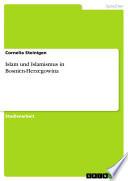
Islam und Islamismus in Bosnien-Herzegowina
Studienarbeit aus dem Jahr 2009 im Fachbereich Orientalistik / Sinologie - Islamwissenschaft, Note: 1,7, Friedrich-Schiller-Universitat Jena (Insitut fur Sprachen und Kulturen des Vorderen Orients), Veranstaltung: Islam und Islamismus, Sprache: Deutsch, Abstract: Auf der diesjahrigen Berlinale war Na Putu" (engl. Titel On the Path") zu sehen, ein Film der bosnischen Regisseurin Jasmila bani von 2010. Es geht um Luna und Amar, ein bosnisches Paar, das einer schweren Belastungsprobe unterzogen wird, als Amar wegen Trunkenheit seine Arbeit verliert. Auch der gemeinsame Kinderwunsch lasst sich nicht verwirklichen, da Amar aufgrund seiner Alkoholabhangigkeit zeu-gungsunfahig geworden ist. Durch einen Veteranen aus dem Bosnienkrieg, den er zufallig wiedertrifft, findet Amar schliesslich eine neue, gutbezahlte Arbeit in einer muslimischen, einer wahhabitischen Gemeinde. Diese beeinflusst ihn so stark, dass er sein ganzes bisheriges Leben in Frage stellt und sich der radikalen islamischen Doktrin des Wahhabismus zuwendet. Luna erkennt Amar nicht wieder und hegt erst Misstrauen, dann grosse Abneigung gegenuber dem Einfluss, den die wahhabistischen Fundamentalisten auf Amar ausuben. Der Film zeigt einen Aspekt des bosnischen Islam, der seit dem Bosnienkrieg (1992-1995) immer mehr an Bedeutung gewonnen hat: Der zunehmende Einfluss auslandi-scher islamistischer und wahhabistischer Gruppierungen in dem noch immer wirt-schaftlich und sozial geschwachten Land. Seit dem Kriegsende hat Saudi-Arabien beispielsweise etwa 3000 Projekte in ganz Bosnien-Herzegowina finanziert. Somit gelangte nicht nur eine betrachtliche Summe an wirtschaftlicher Aufbauhilfe ins Land, sondern auch die fundamentalistische wahhabistische Doktrin der Saudis. Das aggressive Vorgehen islamistischer und wahhabistischer Aktivisten in Bosnien, aber auch in anderen Balkanstaaten, resultiert in internen Streitigkeiten und Schismen innerhalb der muslimischen Gemeinschaften, die tradi-tionellerweise einen mode
- ISBN 13 : 3640784510
- ISBN 10 : 9783640784516
- Judul : Islam und Islamismus in Bosnien-Herzegowina
- Pengarang : Cornelia Steinigen,
- Penerbit : GRIN Verlag
- Bahasa : de
- Tahun : 2010
- Halaman : 52
- Google Book : http://books.google.com/books?id=-6m_smrsdUUC&dq=intitle:islam+moderat&hl=&source=gbs_api
-
Ketersediaan :
Studienarbeit aus dem Jahr 2009 im Fachbereich Orientalistik / Sinologie - Islamwissenschaft, Note: 1,7, Friedrich-Schiller-Universität Jena (Insitut für Sprachen und Kulturen des Vorderen Orients), Veranstaltung: Islam und Islamismus, ...



